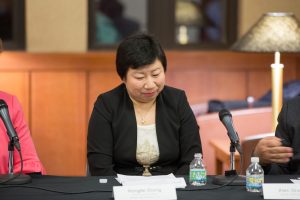

By:
Gregory P. Bufithis, Esq.
Founder/CEO
The Project Counsel Group
18 December 2017 – China has become incredibly integrated into our economic, political and cultural life. China’s rise as a consumer economy — the once export-orientated powerhouse — means it is now much more internally focussed, creating ample opportunities for companies looking to expand abroad.
One of the most important business stories of the next decade will be the flow (or perhaps, non-flow) of U.S.-China commerce, and European-China commerce. And obviously it will be difficult in the U.S. because concern is heightened. Last week, the U.S. Senate Congressional Executive Commission held hearings on China’s influence in business, and this week’s cover story in the Economist magazine (click here) is about China’s “sharp power”.
Last month I had the opportunity to get a flavor of China business in the U.S. and China business in Europe. I attended “Going Global – The China Factor” at George Washington University Law School, and I also attended Europe’s premier high-tech conference called Slush in Helsinki, Finland. Europe, for the most part, is welcoming China investment and business with open arms.
I will briefly address the Slush conference and the European view of China business at the end of this post. But first I want to talk about the George Washington University Law School event which launched a discussion by industry-leading Chinese and U.S. company executives, legal and business policy experts on how to build successful business relationships with Chinese companies both in China and in the U.S. and to provide services and products in the U.S. which appeal to Chinese companies seeking U.S. market access.
NOTE: this was a D.C. Women’s Bar Association program which was the first joint GWU Law School and GWU Confucius Institute event hosted at GWU Law School.
First, a few short bios on the panel:

Gang Xu/Associate General Counsel/The Hershey Company – Mr.Xu leads legal support to the international commercial and global shared services functions of The Hershey Company. Gang joined The Hershey Company in 2013 with a diverse international legal background. He served as the General Counsel and Vice President of McDonald’s (China) Co. Ltd., and the Legal Director and Associate General Counsel of Walmart (China) Investment Co., Ltd. in charge of its legal work for M&A, e-commerce and disputes resolution. Prior to his in-house legal experiences, Gang was a transactional attorney practicing in the United States and Asia with international law firms such as Morrison & Foerster LLP, Bracewell LLP, Freshfields Bruckhouse Deringer, and Debevoise & Plimpton. Mr.Xu has worked upon a variety of corporate, project finance, entertainment and international transactions since 1994. He is a graduate of Peking University Law Department, Georgetown University Law Center and Boston University Law School, and is admitted to practice law in NY, DC, VA and PA.

Anna Ashton/Director, Business Advisory Services/U.S.-China Business Council – Since January 2016, Ms. Ashton has served as the Director of Business Advisory Services at the US-China Business Council. Ms. Ashton began her China career as an intelligence officer for the Department of Defense, where she briefed the Vice President, the Secretary of Defense and top military officials on strategic China issues. Following her time at the Defense Department, Ms. Ashton worked for her home state of Arkansas to develop a strategy for recruiting Chinese investment, organizing and managing visits by Chinese trade delegations and identifying a Chinese consultant to represent Arkansas in Beijing. From 2008 through 2012, she worked in the International Division of the US Chamber of Commerce, primarily focused on China trade and investment issues. She then worked as an economic and trade analyst at the US-China Economic and Security Review Commission while pursuing a J.D. at Georgetown University. After graduating from Georgetown, Ms. Ashton spent time working on international trade cases at Perkins Coie LLP. Ms. Ashton began her China studies in 1997 in order to pursue an interest in Chinese literature. In addition to her J.D. from Georgetown Law, she holds a BA in Chinese Studies from Wellesley University, and an MA in East Asian Languages and Civilizations from the University of Colorado at Boulder.

Hongfei Zhong/Chief Financial Officer/Lantian Development, LLC. – Hongfei joined Lantian Development LLC as its Chief Financial Officer (CFO) in 2016. As CFO, Hongfei is responsible for a diverse real estate development company’s overall financial, tax and accounting functions. Ms. Zhong has held financial professional positions in China and the US within both the private and public sectors. Her US positions prior to joining Lantian Development include serving as Assistant Controller at Clark Enterprises, Inc. and as the Director of Property Accounting/Property Controller for Mills Corporation which was acquired later by Simon Property Group. In China, Ms. Zhong served as the Director of Tax for the China Investment Corporation (CIC), China’s sovereign wealth fund. She also served in multiple positions at the Ministry of Finance of China. Ms. Zhong received her Bachelor’s and Master’s degrees in Economics-Public Finance from Central University of Finance and Economics, well-known in China as “the Cradle of Giants in the Field of Finance and Management”. She also received a Master of Accountancy from the George Washington University School of Business. She is a US Certified Public Accountant and a Board Member and past President of the Children’s Hope and Future Foundation.

Alec Orudjev/Partner/Schiff Hardin LLP — Alec Orudjev has advised Chinese clients with securities listed on major U.S. exchanges on a broad range of public company-related financing and compliance issues. He is a seasoned securities partner practicing in the areas of federal securities/corporate laws, corporate governance/compliance, and broker-dealer rules and regulations at Schiff Hardin’s Washington, DC offices. His broad-based client work includes experience with complex international and domestic securities transactions, SEC periodic disclosures/compliance matters, SOX, Dodd-Frank, JOBS Act and corporate governance/compliance (including Board/standing committee guidance on various issues, including executive and Board compensation), and US Stock exchange listing/delisting and regulatory/enforcement matters. He has written and spoken on various transactional topics, from CMPOs to SEC approvals. He is fluent in Russian and proficient in German and frequently serves as a translator. Mr. Orudjev was awarded an LLM in Securities and Financial Regulation, Banking, Corporate, Finance, and Securities Law from Georgetown University Law Center; a Masters in Economics from Syracuse University – Maxwell School; a JD in Banking, Corporate, Finance, and Securities Law from Syracuse University College of Law; and a Bachelor’s in Economics (Industrial Organization), Magna Cum Laude, from North Carolina State University.

Valerie J. Pelton – The Co-Chair of the WBA’s In-House Counsel Forum, she was the moderator. Ms Pelton is an attorney, mediator, entrepreneur and former military officer who represented U.S. and international technology, telecommunications, software and aerospace companies in Europe, Asia and the Persian Gulf for over 18 years. Prior to entering federal service, she founded the Pelton Law Firm P.C. and was Of Counsel at Kalbian Hagerty LLP; Co-Founder, Vice President and General Counsel of the Enterprise Trade Group LLC; an Associate at De Martino Finkelstein Rosen & Virga; and Corporate Counsel at HQ British Aerospace North America and BAE Systems Regional Aircraft. Prior to practicing law, she served as a U.S. Air Force Signals Intelligence and Adversary Electronic Combat Operations Officer. She is admitted to practice in Virginia, New Jersey, California and the District of Columbia. Ms. Pelton was awarded an LLM with Highest Honors in National Security & U.S. Foreign Relations Law from George Washington University (“GWU”) Law School, a Masters Certificate in Government Contracting from GWU Business School, a J.D. from Whittier College, an M.A. in Political Science from the University of Nevada at Las Vegas and B.A.s in French and Modern European Studies from Vanderbilt University. She is studying Mandarin at GWU’s Confucius Institute and is published in multiple journals, including the Journal of Air Law and Commerce. She is active in Washington area business, legal and sailing groups, and enjoys Argentine tango, salsa and waltz.
The discussion
In any event of this scope, it is difficult to capture all the thoughts expressed, all the points made. And as furiously as I wrote … I have 22 pages of notes … the following is going to be what I found important from each speaker.
Serving on the U.S.-China Business Council, Anna Ashton is well familiar with legislators whose aim is to protecting the United States against “potential adversaries, such as China” that might attempt to acquire critical U.S. technologies and know-how through investment in U.S. companies. She touched upon legislation that would reform the Committee on Foreign Investment in the United States (CFIUS), an interagency body responsible for reviewing inbound foreign investment for national security risks.
CFIUS (the Committee) is an interagency committee that exercises delegated presidential authority to review “covered transactions,” which are currently defined by statute as mergers, acquisitions, and takeovers by or with any foreign entity that could result in foreign “control” of a U.S. business, to determine the effect of the proposed deal on U.S. national security. The Committee is chaired by the Secretary of the Treasury, and its voting members include the heads of the Departments of Commerce, Defense, Homeland Security, Justice, State, and Energy; the U.S. Trade Representative; and head of the White House Office of Science and Technology. The Director of National Intelligence (DNI) and the Secretary of Labor serve as non-voting, ex officio members. Other White House offices and personnel may act as observers and participate in CFIUS reviews on an ad hoc basis.
The legislation Ashton noted is the Foreign Investment Risk Review Modernization Act which seeks to fill in gaps in the current investment review process, expanding CFIUS’s jurisdiction to include a broader range of transactions. These include non-passive, minority-position investments in critical technology or infrastructure; joint ventures involving technology transfers to a foreign entity; and real estate investments near military or other national security facilities. The bill also includes a provision addressing concerns about acquisition of early-stage technologies by unspecified “countries of special concern” that pose a significant national security threat. It would nearly double the list of national security factors for CFIUS to consider in its risk reviews, incorporating attention to “countries of special concern” in the security analysis.
Why? Worries about the surge of Chinese investment in the United States, particularly in high-tech industries, has driven much of the recent discussion around proposals to reform CFIUS. The bill’s chief architects make no secret of their concerns about recent trends in Chinese investment in the United States, and have described China’s approach as “weaponizing” investment to accomplish strategic objectives. This bill is, first and foremost, about China.
And the issue is not simply the volume of investment coming from China. Policymakers worry that the Chinese government is directing outbound investment in early-stage, cutting-edge U.S. technologies with potential military applications – including artificial intelligence and robotics – in part to advance China’s military modernization and diminish America’s technological advantage. Some of this investment is done by nominally private firms that nonetheless maintain close links to the Chinese government and the Chinese Communist Party.
In Ashton’s view because China will continue to be a “country of special concern” and because Chinese industrial policies related to U.S. technology acquisition are central targets of the legislation, any real Chinese attempts at significant acquisitions or investments will be dead in the water.
* * * * * * * * * *
On the flip side of this … investment in China by U.S. companis …. Gang Xu of The Hershey Company noted that Chinese consumers are very sophisticated and expect products to be on very high standards. “There is no brand loyalty in chocolate unless you perform”, he said, meaning consumers who are loyal to a brand remain customers because they believe you offer a better service and higher quality than anyone else. This happens regardless of pricing or other financial reasons.
He said one company that “gets it” is Starbucks, and that has been amply demonstrated when Starbucks opened its first super-sized gourmet location in China, and it brought in the crowds. The location in Shanghai is 30,000 square feet and serves gourmet, nitrogen-infused drinks and food baked in-house. Starbucks said it wanted to boost its premium brand image with the Roastery, a window into the glamor and chill life of new epic high-class locations for the leading brand. The lag of brick-and-mortar locations means Starbucks also needs to reinvent itself as an experience center. Starbucks plans to open 12,000 such new stores around the world in the next five years. It picked China for the debut. Not the U.S. Not Europe.
Why? We return to something Gang said. Starbucks recognised. … and executed on … concepts of family brand loyalty and partnerships. Much has been written about Starbucks’ successful strategy in China. But Gang said he attributes the company’s success to its long-term commitment to the market, well-executed collaborations with Chinese partners, superior supply chains, adopting local technologies, and offering local items on its menu. These are just the visible tactics of a much more fundamental strategy. From the beginning, Starbucks has spoken to the essence of Chinese culture, giving it the wisdom to develop the long-term vision, local relationships, and localized product offerings for the market. All global companies can learn from this: attention to and execution around Chinese culture is the root of a foreign brand’s success in China.
Another success in China, said Gang, was KFC. Why? Because KFC entered the Chinese market quite early, it becames a symbol of western food. So it somehow represented “cool”,”fashionable” in Chinese people’s mind … and KFC leveraged that. But at the same time, because KFC is delicious and fast … again, that Chinese concept that brand loyalty needs to be based on quality and service … means busy people can have their meals quickly and children love the taste of chicken. It may have been 30 years since its first store in Beijing, but KFC is still the reigning champion of the domestic market. And again, it understood the culture. Besides fried chicken and Zinger burgers, it offers a selection of green food including quinoa salads, salmon sandwiches and fresh fruit juices – a direct appeal to the market.
And one critical thing to note, Gang, said was that China is quickly moving from a manufacturing market/economy to a consumer economy and that is spurring the expansion of new service businesses ranging from catering to financial services, as well as the further expansion of demand for consumer products, across China’s immense and growing market. At the same time, business services will grow more quickly as the country’s economy continues to develop. It is an old statistic but one that business and investors should never forget: roughly 70% of the U.S. economy is comprised of consumer spending. What took us decades to develop China is trying to accelerate for itself.
Gang noted that the Chinese consumer market is in the midst of a transformation that offers tremendous new opportunities. The rise of the upper-middle-class (estimated to be 1 billion souls by 2030) and affluent households as the drivers of consumption growth, and sophisticated consumers, means a profound reshaping of China’s economy and consumer market over the next five years.
* * * * * * * * * *
Alec Orudjev, having advised Chinese clients with securities listed on major U.S. exchanges on a broad range of public company-related financing and compliance issues, and also knowing the Chinese securities markets, focused on two themes: the structure of Chinese securities markets, and why Chinese companies want to list their securities in the United States.
He noted that China’s securities markets are unlike those of New York. Or even Amsterdam or London. Those markets evolved over centuries from myriad interactions among those seeking finance on the one hand and savers seeking rewarding investments on the other. It was a long process. China’s market were first designed to serve state purposes, that is to assist in the financing of the state sector of the economy. Rather than evolving in a bottom-up pattern, they are controlled, top-down securities markets. These markets have slowly developed economic functions, a regulatory structure and governance mechanisms. But though slow, in reality it has been done at a pretty rapid pace: less than twenty years’ to be “modern”, albeit not yet fully developed.
Because the stock markets in China were built for the benefit of the Chinese government it was difficult for small companies to list on these exchanges and there really wasn’t a Chinese version of the Nasdaq to cater to small companies. Consequently, Chinese companies had to look at U.S. exchanges to raise equity. At the same time, there was a certain prestige in listing on U.S. exchanges; it was a sign to many that the company was legitimate and playing in the big leagues. As time has gone on, the Chinese markets have matured and are increasingly accessible to smaller local companies. What’s more, many Chinese companies and investors are becoming more self-confident in their own markets; companies no longer need a foreign seal of approval to look good in the eyes of employees, competitors or investors.
But the key for Chinese businesses is the liquidity of the U.S. markets, where there are many bids and offers and participants can easily enter and exit it for minimal transaction cost.
He also noted that the effect of increased wealth and consumer spend in China is already being felt around the world, with recent tourism numbers showing that visitors from the country spend more than any other country in the world with a record $102 billion shelled out on the road. For growing companies with overseas aspirations, China seems like the perfect destination for expansion. But he noted that with lengthy bureaucratic procedures and an unfamiliar consumer environment awaiting those who try, having local advisors on hand to help navigate the complex market is crucial.
* * * * * * * * * *
Hongfei Zhong, being Chief Financial Officer of a real estate investment and development company, made the point that most Chinese investment in the U.S. is real estate or mergers and acquisitions. She said Chinese buyers are increasingly impacting residential and commercial real estate markets globally, not just in the U.S. China also became the largest cross-border real estate investor, overtaking the United States. And what is driving the charge is that many Chinese have an affinity for property. (One might also surmise that a declining yuan, volatile domestic financial assets and competitive local property markets are also spurring these overseas purchases but I did not have a chance to discuss that with her). And as the Chinese become much more savvy, as the information flow increases, they become more educated as an investor class.
NOTE: at the Slush conference in Finland that I mentioned at the beginning of this post, a Chinese investor told me that with camera surveillance and communication technologies, Chinese owners can monitor their assets remotely in real time.
Also, it used to the case that only ultrahigh-net-worth individuals bought overseas. Over the last five years, that has changed. A much larger portion of the population is willing and able, through the growing middle class and the wealth of the nation increasing. And given the U.S. is the most popular destination for Chinese immigrants, students and corporate investment, that drives investment in property. Although that might change given the posturing of the Trump administration.
* * * * * * * * * *
POSTSCRIPT
For comparison purposes, let me briefly note the Slush conference I mentioned .
There’s rising interest in particular from China technology investors in Europe, especially the Nordic region. There have been several mega deals by the Chinese tech titans into Finnish technology companies. These investments include Baidu in Indoor Altas in 2014, Alibaba in MariaDB in 2017 and Tencent in Supercell in 2016.
Likewise, European companies are looking to China for its large and fast-growing markets. In a positive, the Chinese business accelerator COMB + and the Beijing Institute of Collaborative Innovation debuted an artificial intelligence fund with fund size of Euros 65 million, focused on international technology startups entering the Chinese market. The fund is part of the COMB+ Sino Track accelerator program that has worked with 19 Nordic startups since a launch a year ago.
Moreover, some particularly Finnish business models and European business models are making their way to China. As one example, HEI Schools, backed by academics at the University of Helsinki, is taking the acclaimed Finnish early education model to China. It’s running a pilot at a school in Baotou, China and is looking to expand in China and elsewhere, including Australia next year.